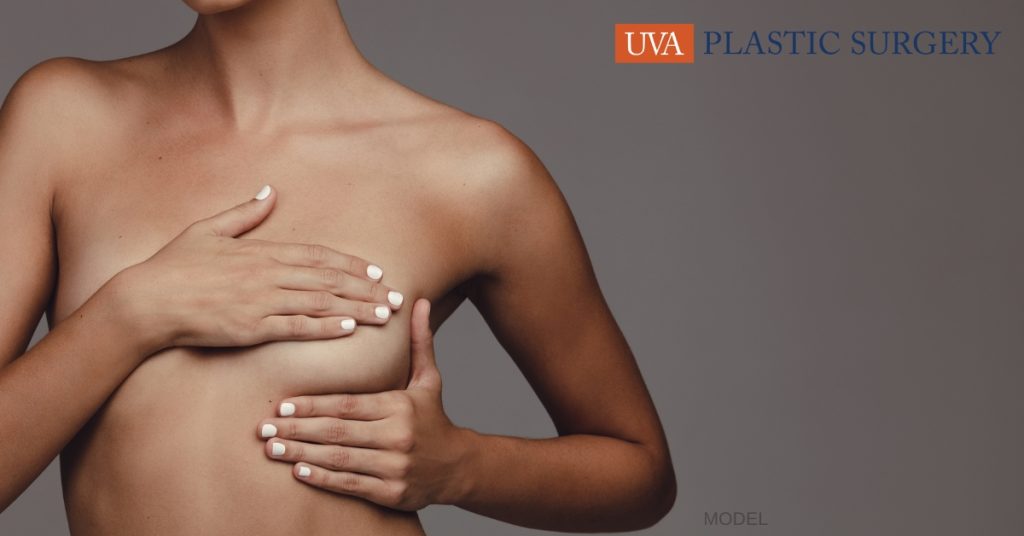Breast reconstruction is a deeply personal journey for those who have undergone mastectomy or breast cancer treatment. The surgery is often an essential part of the healing process for its role in reclaiming a patient’s sense of self and body confidence.
At the UVA Breast Reconstruction Center, we offer 3 primary types of breast reconstruction: implant-based reconstruction, autologous tissue reconstruction, and free-tissue reconstruction. We’ll explore the benefits of each option below to help you make an informed decision on which option may be best for you.
Implant-Based Reconstruction: A Path to Regaining Symmetry
Implant-based breast reconstruction is a popular choice for breast cancer patients. It involves the use of saline or silicone breast implants (the same as those used in breast augmentation) to recreate the shape and volume of the breast after mastectomy. This method offers several benefits:
- Less Invasive: Implant-based reconstruction is generally less invasive compared to other methods, potentially lowering the risk of surgical complications.
- Faster Recovery: Patients often experience a shorter recovery time, allowing them to return to their daily routines sooner.
- Customizable Results: The variety of implant options gives patients the opportunity to choose the look that best matches their preferences and existing breasts. Your surgeon can further refine your results with fat grafting to add softness to the breasts.
- Simplicity: The surgical process for implant-based reconstruction is relatively straightforward, making it a viable option for those who prefer a less complex procedure.
- Predictable Results: Advances in implant technology and surgical techniques have made the results of implant-based reconstruction more predictable, providing patients with a sense of reassurance about the outcome of their procedure.
While breast reconstruction with implants has numerous advantages, it’s important to remember that implants may require periodic replacement or maintenance over time. Additionally, not all patients are suitable candidates for this method, as it may depend on their health and individual circumstances.
Autologous Tissue Reconstruction: Harnessing Your Body’s Own Resources
Autologous tissue reconstruction uses a woman’s own tissue, typically from the abdomen or back, to reconstruct the breast. This method offers several unique benefits:
- Natural Look and Feel: Autologous tissue reconstruction results in a breast that closely resembles the patient’s natural breast in terms of appearance and texture.
- Long-Lasting Results: Unlike implants, autologous tissue reconstruction does not require replacement. The reconstructed breast should age naturally with the rest of your body.
- Lower Risk of Complications: Since the tissue used is from the patient’s own body, there is a reduced risk of rejection and infection.
- Improved Contouring: Autologous tissue reconstruction allows for improved contouring, providing a more balanced appearance.
However, it’s important to note that autologous tissue reconstruction is a more extensive procedure as it requires a second surgical site to harvest tissue for use in the breasts. Patients must have enough available donor tissue to undergo this type of reconstruction successfully and be prepared for a longer recovery period.
Free-Tissue Reconstruction: Precision and Personalization
Free-tissue reconstruction, or free flap breast reconstruction, is considered one of the most advanced techniques in breast reconstruction. It involves transferring tissue, often from the abdomen, buttock, or thigh, to the breast area and reestablishing blood supply using microsurgery. This method provides a range of benefits:
- Superior Aesthetics: Free-tissue reconstruction allows for precise shaping and contouring, resulting in a breast that closely resembles the natural breast.
- Natural-Looking Results: Like autologous tissue reconstruction, free-tissue reconstruction provides a natural look and feel to the reconstructed breast.
- Result Longevity: The transplanted tissue integrates well with the chest, providing a durable and long-lasting solution.
- Reduced Risk of Complications: Just as with other autologous tissue reconstruction procedures, this type of reconstruction uses your own tissue, so the risk of rejection and other complications is lowered.
However, free-tissue reconstruction is a complex surgical procedure that requires specialized expertise. It’s generally longer in duration and may involve a more extended hospital stay compared to other methods. This method is typically reserved for patients who require more extensive reconstruction or have unique medical considerations.
Learn more about recovery from breast reconstruction in our related blog post.
What Type of Breast Reconstruction Is Best for You?
The best reconstructive surgery for your unique needs will depend on multiple factors, including your medical history, overall health, body type, and personal preference. Your surgeon will work closely with you to develop a personalized treatment plan that aligns with your goals and expectations.
For further information, The American Society of Plastic Surgeons covers your breast reconstruction options, from timing to technique to questions to ask, in their breast reconstruction video.
Take the Next Step
Breast reconstruction is a deeply personal journey, and there is no one-size-fits-all approach. At UVA Breast Reconstruction Center, our team is dedicated to providing compassionate, patient-centered care. We understand that this is a pivotal moment in your life, and we’re here to provide the expertise and support you need.
If you’re ready to explore your breast reconstruction options further, please request a consultation or call us at (434) 924-1234 to set up an appointment.



Leave a Reply